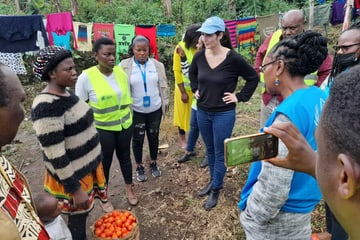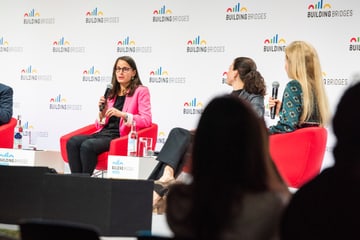Professionals in international cooperation – finding the right balance as a family
People interested in a career in international cooperation often have questions about how this type of career can coexist with their desire to start a family. At Forum cinfo 22, Liliana de Sá Kirchknopf, Head of Private Sector Development Division at SECO and Victoria Martinez, Humanitarian Affairs Officer and Head of Coordination at OCHA Cameroon, shared their experiences and insights on this topic.

Liliana de Sá Kirchknopf has 23 years of experience in international cooperation. She was Senior Advisor to the Swiss Executive Director's Office at the World Bank in Washington, Private Sector Development Specialist at the IFC and Head of the Swiss Cooperation Office in Budapest. With an international background deeply rooted in her family, Liliana has a Master's degree in Economics and a minor in Political Science. Today she lives in Biel, Switzerland, with her husband, their 11-year-old daughter and their dog.
Victoria Martinez always knew she wanted to pursue a career in international cooperation, especially with the United Nations. After completing her Master's degree in Political Science and Russian Literature at the University of Zurich, she has had several internships, followed by positions at the Estonian Ministry of Foreign Affairs in New York, with a Tajik NGO in Punjakent and at the International Criminal Court in The Hague. In 2016, she secured a JPO position with OCHA in South Sudan. Today, Victoria works as a Humanitarian Affairs Officer for OCHA in Cameroon. Now a single mother, she lives in Yaundee with her two children.
This article summarises the most important aspects of the discussion between Liliana de Sá Kirchknopf and Victoria Martinez and sheds light on how people manage their careers in international cooperation in combination with family life.
Much of what we discuss here is just as relevant for men.
Liliana and Victoria particularly agree on one thing: much of what is discussed about combining a career in international cooperation with plans for a family has long since ceased to apply only to women. It is just as relevant to men. In today's working environment, it has, fortunately, become normal for women to pursue a career even if they want to have children. It is no longer today a question of how to "have it all" as a woman but more about finding the right balance as a family.
Are there jobs that are out of reach for people with families?
In this sector, as in others, it is a fact that there are jobs that are less compatible when having children. As Victoria Martinez explains, in international cooperation, the limitations in job choice are mainly linked to the location of the job. For example, she started her career at the United Nations in South Sudan. This is a non-family duty station. She later started her family in Senegal and Cameroon, where she still lives with her children and works for the United Nations.
However, a non-family duty station does not automatically mean that such positions are out of the question for people with families. There are people who choose to work in a non-family duty station while living away from their family for a while. Many travel to their families every few weeks thanks to the "Rest & Recuperation Policy", thus combining their career with family life. This shows that, despite certain costs and effort, there are practically no professions in international cooperation that are entirely out of reach for people with families. However, one has to be prepared to make certain choices and compromises.
Financial security for the family
One aspect that is very important for people working in the sector is longer-term financial security for the family. At the UN, in particular, there is often a lack of job security due to the structure of the organisations and the work. In addition, the financial aspect of childcare naturally plays an important role. For example, it would not be possible for Victoria Martinez, a single mother by choice, to organise childcare and household duties in the same way in a country like Switzerland. In Cameroon, she can organise herself in such a way that she can spend "quality time" with her children outside of work. However, such considerations should be seen from more than just a financial perspective. For both Liliana and Victoria, their children are a great blessing, not only outside their work but also for their work.
Having children has definitely made me a better manager.
Victoria Martinez

Courageously accepting new challenges
For both Victoria and Liliana, their decision to have children did not significantly influence their career choices. In fact, this is what they advise young people who are thinking about a career in international cooperation. At the beginning of your career, you should be excited and motivated by all the different possibilities and not worry about how to combine your career with the desire to have a family. The choice should never be an “either/or”. Both agree that entering the industry today is challenging enough. Plans for a family can be considered later in your career. You will always find a solution once you've started.
Stay persistent! Working in this sector and especially getting started is a challenge. Be patient and don't give up.



